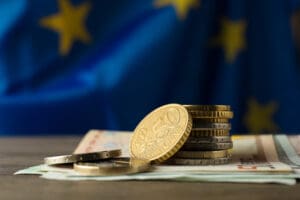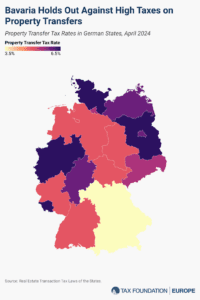
The EU’s Windfall Profits Tax: How “Tax Fairness” Continues to Get in the Way of Energy Security
8 min readBy: ,On 30 September 2022, the Council of the European Union agreed to impose an EU-wide windfall profits taxA tax is a mandatory payment or charge collected by local, state, and national governments from individuals or businesses to cover the costs of general government services, goods, and activities. on fossil fuel companies to fund relief for households and businesses facing high energy prices (due primarily to Putin’s war on Ukraine). According to some in the European Parliament, however, the current tax burden on energy companies does not go far enough.
Given the dire economic environment for families and the urgency to transition away from Russian energy, extracting profits from fossil fuel companies to transfer to needy households sounds like killing two birds with one stone. It might even sound fair in a year when oil companies are making record profits because of higher energy prices.
Unfortunately, it’s not sound policy. If history is any indicator, it will only make these goals harder to achieve.
The tax (or “solidarity contribution” in EU-speak) is calculated on taxable profits starting in 2022 and/or 2023, depending on national tax rules, that are above a 20 percent increase in the average yearly taxable profits since 2018 at a rate of at least 33 percent. The EU anticipates the policy will raise about €140 billion.
Two separate but equally important EU goals under its REPowerEU plan are to eliminate its dependence on Russian fossil fuels and accelerate the rollout of renewable energy. EU leaders believe this is the best way to secure the EU’s energy supply in the face of Russian aggression while maintaining their commitment to fighting climate change.
But as the common economic cliché goes: if you want less of something, tax it. In the EU’s case, a windfall profits taxA windfall profits tax is a one-time surtax levied on a company or industry when economic conditions result in large and unexpected profits. Inheritance taxes and taxes levied on lottery winnings can also be considered windfall taxes on individual profits. will do this in two negative ways.
First, the tax will lead to less domestic energy production and higher energy imports in the short term at a time when Europe needs more European energy. Doing so makes it harder to decouple from Russian energy sources.
Economically, this is because high oil prices are a signal of strong demand and scarce supply and provide an incentive for increased production. Taxes discourage production because they drive a wedge between the price paid by the consumer and received by the supplier.
Second, the tax reduces the amount of available capital for European energy companies to invest in future projects. This will make it even harder to strengthen the European energy supply in the medium term
The energy sector has two distinct features that produce this effect. For one, the sector is very capital intensive; it requires millions of euros up front to bring energy to market for average consumers.
The sector’s business cycle is also volatile. Some years, energy companies have large profits. In other years, they have large losses. That’s the nature of the industry. Punishing the high returns (with the high risks still in place) without accounting for the high losses disincentivizes capital investment into those companies.
To make matters worse, a windfall profits tax drives up oil imports because it discriminates against domestic oil producers to the benefit of foreign producers. This will only add pressure on European leaders to find alternative energy sources abroad because all 27 member states are now net energy importers, and there is limited scope for an increase in the EU production of fossil fuels..
If European leaders are looking for a proof of concept, the United States already tried a windfall profits tax during the Carter administration in the 1980s when it established an excise taxAn excise tax is a tax imposed on a specific good or activity. Excise taxes are commonly levied on cigarettes, alcoholic beverages, soda, gasoline, insurance premiums, amusement activities, and betting, and typically make up a relatively small and volatile portion of state and local and, to a lesser extent, federal tax collections. of 70 percent on the value of oil sales exceeding $12.81 (in 1980 dollars).
A Congressional Research Service paper found that the tax reduced domestic oil production by between 1.2 and 8.0 percent and increased reliance on foreign oil by between 3 percent and 13 percent between 1980 and 1988 (when the tax was eventually repealed). A 2018 paper in Economic Policy found that the tax reduced domestic production, largely by reducing the total output of wells already in operation.
While there are differences in the EU’s policy design from the 1980s American version, there is no economic reason policymakers should expect a different result. The question is not if the impact will be negative, but how negative it will be.
The bottom line is the EU-wide windfall profits tax on fossil fuel companies will likely:
- Reduce the domestic energy supply in the EU
- Further increase energy prices on consumers at the gas pump and while heating their homes in upcoming winters
- Require even more foreign suppliers besides Russia to send energy to the EU
- Make the green transition more difficult
Nearly six months after the Council agreed to impose an EU-wide windfall profits tax, the EU is already seeing some of these negative consequences.
For example, Europe is producing less energy than in previous years. In European OECD countries, net electricity production was down 8.2 percent in November 2022, compared to the same month in 2021. Furthermore, European consumers have faced increasingly high energy bills despite government support.
In 2022, U.S. companies provided 50 percent of Europe’s liquefied natural gas supplies along with 12 percent of its oil. In addition, the United States Energy Information Administration forecasts that crude oil production in the United States will increase by 4 percent in 2023 and 8 percent in 2024, compared to 2022. At least some of this increase is likely due to increased demand from Europe.
Finally, the EU’s windfall profits tax is causing investor uncertainty, exacerbated by the potential illegality of the tax. ExxonMobil subsidiaries are currently suing the European Council for exceeding its powers. And due to the UK’s windfall profits tax, some companies are even rethinking projects that could have otherwise increased European energy security.
Why have EU leaders chosen such a bad tax policy for energy security at a time when Russia is weaponizing it? The answer is the EU’s obsession with what it calls tax fairness, and its misunderstanding of what fossil fuel companies do with capital.
The EU promotes tax fairness in all areas of tax policy, not just in the energy sector. This verbiage has been used to justify proposals to implement the OECD’s global minimum tax, consolidate the corporate tax baseThe tax base is the total amount of income, property, assets, consumption, transactions, or other economic activity subject to taxation by a tax authority. A narrow tax base is non-neutral and inefficient. A broad tax base reduces tax administration costs and allows more revenue to be raised at lower rates. , and debate wealth taxA wealth tax is imposed on an individual’s net wealth, or the market value of their total owned assets minus liabilities. A wealth tax can be narrowly or widely defined, and depending on the definition of wealth, the base for a wealth tax can vary. ideas.
In this case, the EU is asking fossil fuel companies to pay their “fair share” in the form of a “solidarity contribution” to help those families in need.
However, missing from the tax fairness calculation is any consideration of the broader fiscal situation. Fairness is not only about the money a company pays to the government in taxes. It should also be about economic investments, jobs, and the growth a company generates for the public good. And, more specifically to the current wartime situation, it should be about the energy security that companies provide for all EU families.
The EU’s policy shows that policymakers believe taxing fossil fuel companies will reduce climate-damaging energy production and leave market share for the rapid emergence of renewable energy sources. This thinking is naïve.
It may sound surprising to some, but one can oppose the EU windfall tax while also supporting a transition away from fossil fuels.
According to the IEA, “oil majors (Shell, BP, ExxonMobil, Chevron, TotalEnergies, ConocoPhillips) and Equinor accounted for about 90% of total clean energy investment by the oil and gas industry in 2021 and almost all the investment tracked so far in 2022. Overall, European companies are out in front for diversified spending, with major roles as investors in offshore wind.”
The result of the tax is therefore not only taking capital away from more carbon-intensive energy production, but it is also removing desperately needed capital from the companies that invest in clean energy the most. In the medium term, this will impact the EU’s ability to roll out renewable alternatives to Russian energy.
So, if the windfall profits tax will hurt the European economy and slow down investment in renewable energy, how should the EU raise €140 billion to help those families in need of economic relief?
One obvious candidate is closing the Value-Added Tax (VAT) gaps that are pervasive in the EU. There are two kinds of VAT gaps. One is the tax compliance (or enforcement) gap which in 2019 equaled nearly €140 billion. Already, this would be enough money to replace the expected revenue from the EU windfall tax.
However, for skeptics who do not believe it is possible to have perfect compliance, there’s also the policy gap. This represents the revenue gap caused by products that are covered by the VAT and exemptions that are made in law to exclude products from the VAT. In 2019, the policy gap was over €1 trillion. Even if compliance is not perfect in this scenario either, it will certainly generate more than €140 billion.
The main advantages to focusing on VAT reforms instead of taxing energy companies during an energy crisis are that the VAT is already EU law and closing the policy gap broadens the tax base, making the revenues more stable even in poor economic conditions.
Furthermore, consumption taxes tend to be less distortive than windfall taxes. Neutrality is a worthy goal of principled tax policy.
When it comes to providing economic relief to those in need, wartime energy security, and principled tax policy, the EU can do all three. But a windfall profits tax is not the policy to achieve these goals. EU policymakers should put their tax fairness rhetoric to the side and look for principled ways to implement pro-growth tax policy that generates stable revenue and incentivizes energy diversification.
European energy security depends on it.
Update: Originally published on October 4, 2022, this blog was updated on February 27, 2023 to reflect recent developments.

